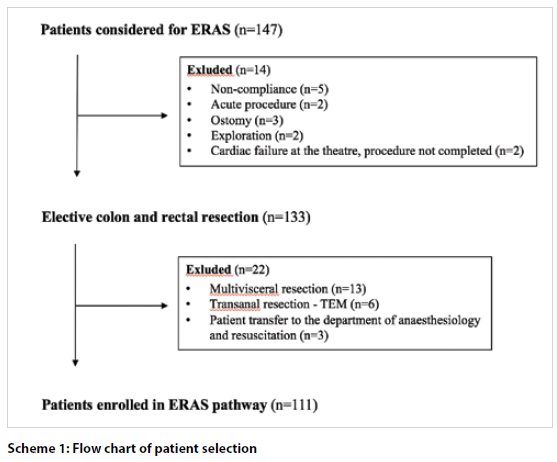Abstract
Introduction: The enhanced recovery after surgery (ERAS) protocol decreases postoperative complications and reduces the length of hospital stay. To achieve these results, high adherence to the protocol is necessary. The level of adherence to the protocol, its efficacy and safety are unknown in geriatric patients. The goal of this study was to assess adherence to the ERAS protocol and its safety in elderly patients undergoing elective colorectal surgery.
Method: This was a single-centre, prospective, non-randomized study. One hundred and eleven patients undergoing elective colorectal resections
were included in the study, irrespective of the type of surgery (laparoscopic or conventional). Perioperative care followed the ERAS protocol
in all patients. The patients were divided into two age groups (<65 years − 51 patients and ≥65 years − 60 patients). Protocol adherence,
postoperative morbidity and mortality, perioperative care parameters, length of hospital stay and readmission within 30 days were monitored
in each group.
Results: Overall protocol adherence was 81.5% in the younger patients and 77.5% in the elderly patients (p = 0.03). No statistically significant difference was found between the two groups in any of the other parameters analysed. No fatalities occurred in the entire study group. The incidence of serious complications (grade IIIa−IIIb) was 7.8% in the younger patients and 6.7% in the elderly. Median postoperative length of hospital stay was 9 days in the younger patients and 8 days in the elderly patients. Readmission rates were 8% in the younger patients and 3.4% in the elderly patients.
Conclusion: Sufficient adherence to the ERAS protocol can be achieved in geriatric patients undergoing elective colorectal surgery without increasing the risk of postoperative complications and readmissions compared to younger patients. Implementation of the ERAS protocol is feasible in
geriatric patients.

